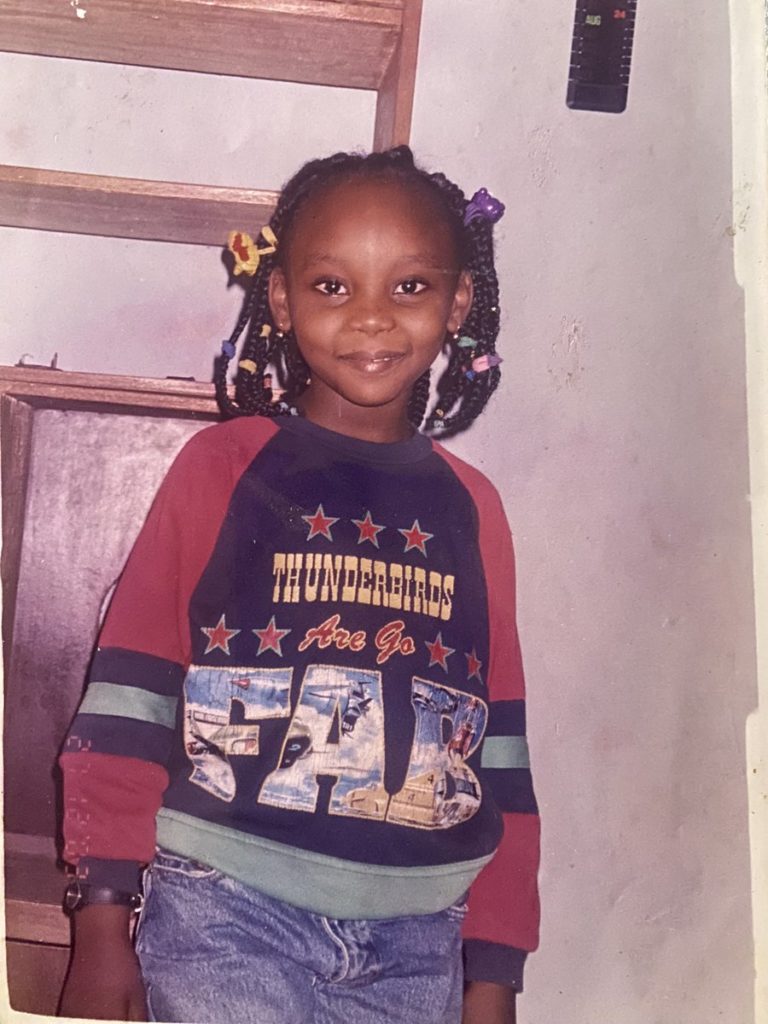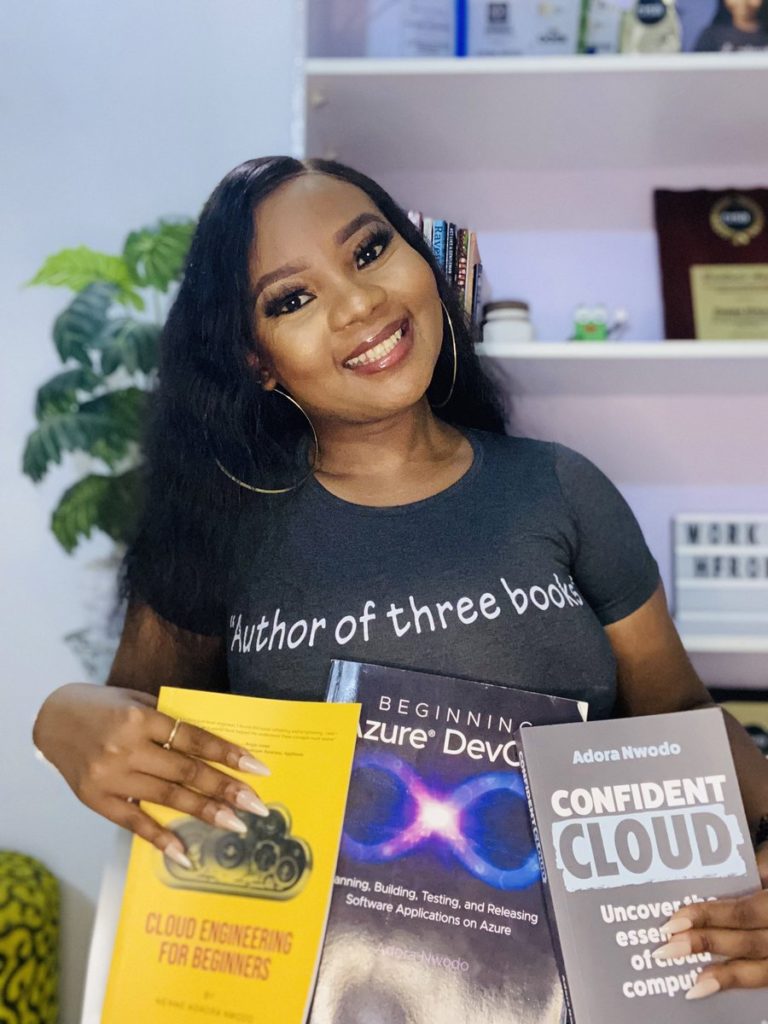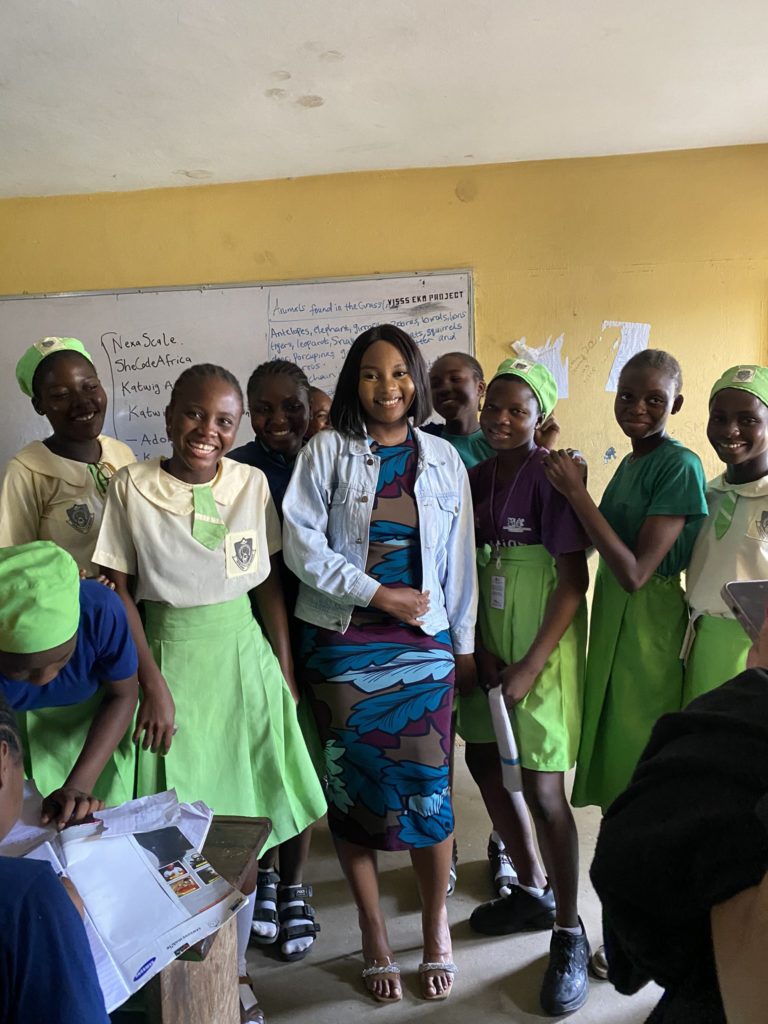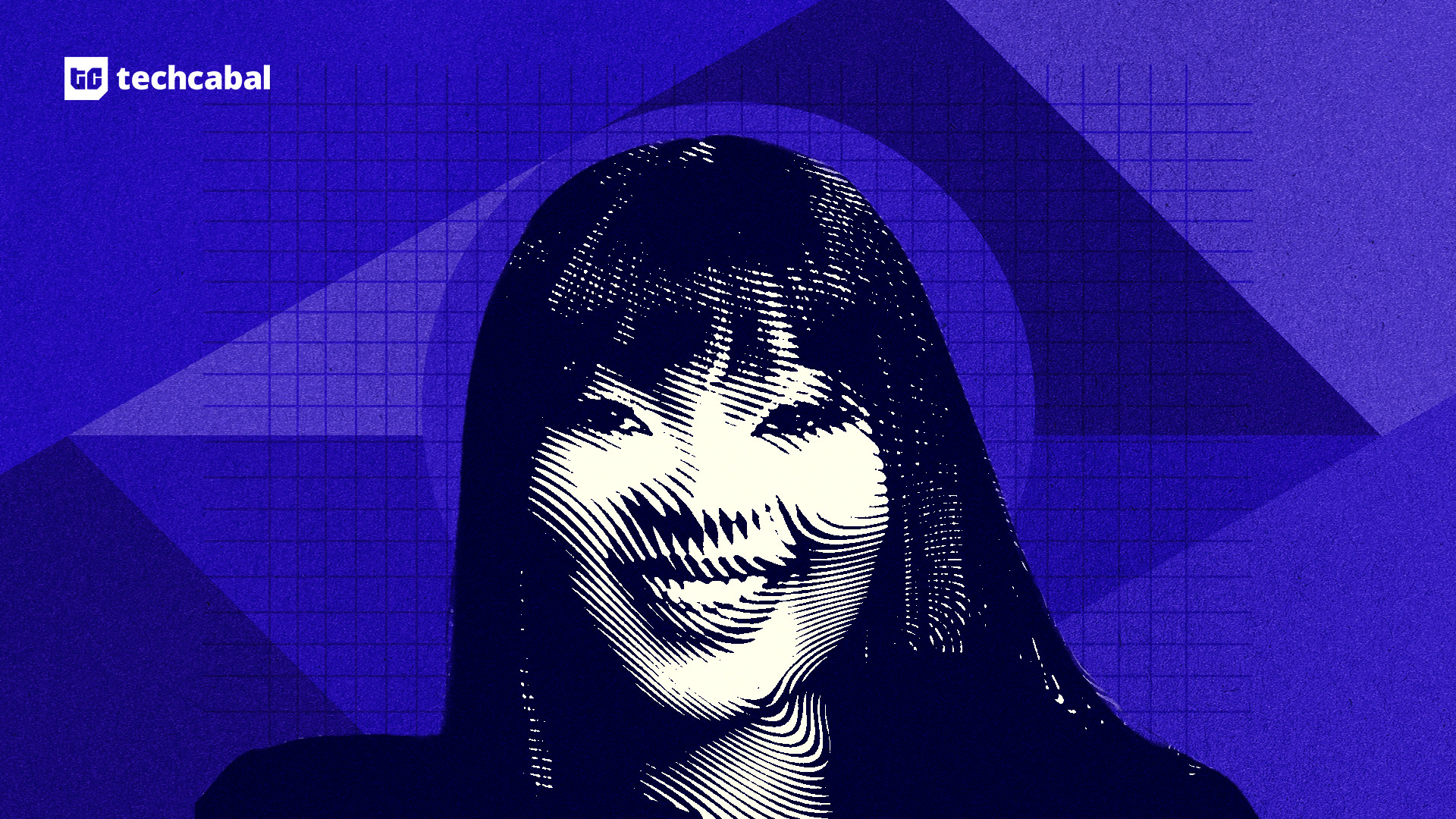On March 15, 2024—a year ago from today—cars and pedestrians bustled beneath the NASDAQ digital billboard in Times Square, where Adora Nwodo’s image glowed. Below her picture read the text: Adora Nwodo, Top Software Engineer of the Year, International Association of Top Professionals (IAOTP).
The publicity was an award perk from IAOTP, a community that spotlights professionals with significant accomplishments. Nwodo, at the time, boasted several: she had been a fast-rising member of Microsoft’s Mesh team in Africa, which developed Global Village—a platform allowing world leaders at the World Economic Forum to virtually visualise problems and solutions, test strategies, and interact with a simulated world. Additionally, she ran NexaScale, an ed-tech nonprofit that has since provided simulated work experience for about 11,000 software engineers, designers, and product managers.
As a truck and cars rolled by, Nwodo stood across from the towering billboard and later posed for a picture in front of it, smiling like she always knew such a moment would come. On our virtual call, she, in many words, tells me that she did.
Nwodo fell in love with computer technology when she first saw a computer at age six in the early 2000s. As the youngest and only girl in a family of boys, she grew up roughhousing with her brothers, the youngest, six years older, until they swapped football for a new interest: a computer her father brought back from a work trip. Though now retired, her father worked offshore for an oil company at the time, a job that kept him away from home two weeks at a time.
“I am not sure what he and his colleagues discussed while they were out there, but he came back convinced that the world is moving toward computers,” Nwodo said in our Google Meet call.
Around that time, Nigeria’s tech scene was quietly bubbling, riding the telecom boom; NITEL’s monopoly had ended. Companies like Globacom, MTN, and Econet made mobile phones more common and SIM cards cheaper, boosting internet use. Cybercafés popped up in cities, and more Nigerians were creating and scaling startups and native technology. Most notable from that time are payment companies Interswitch and social platform Nairaland. Lagos was blossoming into a tech hub, later nicknamed ‘Silicon Lagoon.’”
He wanted his children to engage with this new digital world—just not Nwodo, not yet. He told her to stay away from the computer, promising she could use it once she started secondary school. “My dad was a disciplinarian,” she recalls. “He didn’t think I was old enough for a computer back then. Same reason he wouldn’t let me have a phone until after my WAEC exams. I didn’t start driving or get my own car until my final day at university, either.” He simply didn’t see these things as priorities for her as a young child.
But Nwodo was stubborn, a trait she inherited from both parents, who, she says, rarely backed down when they wanted something. When her father left for his next shift, she turned to her brothers, who had already abandoned their outdoor games for the glowing screen. As their darling, she convinced them to let her use it—a gateway to a digital world that felt infinite. Nwodo fell in love, tumbling into a rabbit hole of learning new things every day.

She recalls using Microsoft Encarta Kids, a now-discontinued digital multimedia encyclopedia and search engine. Nwodo, who sometimes moonlights as a disc jockey, remembers downloading songs on LimeWire, a peer-to-peer file-sharing program that allowed users to share music with each other. “I became a music dictionary growing up, just because I had access to the internet,” she recalled, smiling. “Ask me any old song, and I’ll tell you the year it was released. If I’m wrong, I’ll probably be only two years off.”
In her self-guided exploration of the computer and the internet, she also stumbled onto Visual Basic, a family of programming languages from Microsoft, which was then used for creating Windows-native products. Nwodo recalls coding a calculator to double-check her math homework in Primary school.
Her curiosity and self-study continued into secondary school at Corona, a private school where each student had access to a laptop for ICT classes. When classmates had coding or ICT assignments, they came to her for help, and they sometimes sought her assistance when their PCs needed troubleshooting.
Despite her clear talent and passion, Nwodo’s father strongly opposed her decision to study computer science. He wanted her to pursue law, a profession that was considered more prestigious at the time. Her biggest family support came from her brother, who introduced her to a family friend studying computer science at the Massachusetts Institute of Technology. Defying her father’s wishes, she accepted an admission offer from the University of Lagos. This caused a temporary rift with her dad, who worried she wouldn’t amount to much in that field. But Nwodo says it only fueled her determination—a resolve that persists today. After a few months of silence, they reconciled and are now on great terms. “Somewhere in the back of my mind, I’ve always thought, “This can’t fail—I don’t want to give him a chance [to gloat,]”‘ she says with a laugh.
By then, Nigeria’s tech ecosystem was buzzing with startup energy. Early players were boosted by venture capital, with hyped ventures like Sim Shagaya’s DealDey leading in e-commerce. Tech hubs were sprouting across the country, catalyzing programmers building apps in fintech, edtech, and other sectors. This attracted interest from foreign investors, and the growing pool of talent attracted interest from big tech companies like Google.

The University of Lagos (Unilag) campus in the early 2010s was a reflection of Lagos itself—bustling, competitive, and alive with ambition and opportunity. Students built apps on their own or for class projects. In her third year, Nwodo developed her first mobile app, ‘Third Eye,’ a plagiarism detection tool designed for Nigerian universities, as part of her coursework. She also wrote a paper about it, which helped Unilag win a grant. Later, in 2016, she built an e-commerce platform, MyFortShop, selling made-in-Nigeria shoes she sourced from artisans.
Unilag, like other universities, also supplied talent to Nigeria’s budding startup scene. Some of these people themselves have become tech founders or high-level executives at startups. Nwodo remains friends with some of them, like Jude Dike, founder of GetEquity, a popular investment tech startup, and Raymond Tukpe, CTO at YC-backed Convoy. Nwodo remembers how tech giants like Microsoft and Google recruited directly from campus, sending her peers to internships in Vancouver and San Francisco.
Her first tech job was a software development internship at Neukleos, a digital marketing agency. When the internship ended, Nwodo asked if they could keep her on, turning it into a full-time role. Over three years at Neukleos, she honed her skills and began sharing her expertise on social media, especially through a YouTube channel, AdoraHack, where she posted tutorials and tips for aspiring developers. She was also volunteering to support tech events and was often invited to speak at some.
In 2019, Nwodo’s habit of building in public caught the eye of a Microsoft recruiter. At the time, Microsoft was assembling a team in Lagos to develop mixed reality technologies, a move that gained urgency as the COVID-19 pandemic unfolded in 2020. With the world suddenly reliant on remote collaboration, the company ramped up efforts on tools to bridge physical distances. This Lagos team focused on a key projects: Microsoft Mesh.
Mesh allowed users to interact as holograms in virtual spaces—think virtual meetings or shared creative sessions, offering a lifeline for connection in a pandemic world hungry for innovative ways to work and socialise despite lockdowns and travel bans.
Adora Nwodo’s tenure at Microsoft sparkled with achievements. Over four years, she earned three promotions, rising to Senior Software Engineer through what she calls ‘strategic clarity.’ In our interview, she explained how she mastered visibility and impact, sharing the value of her work both inside and outside the company. “Being visible is crucial,” she stressed. Nwodo aimed to become a manager before leaving Microsoft, working closely with her manager to achieve that goal. “I often asked my manager to send impactful projects my way,” she said.
One of the things she feels most proud of at the time was when the Mesh technology was used at the World Economic Forum Annual Meeting. There, Mesh powered the Global Collaboration Village, an extended reality (XR) platform developed in partnership with Accenture and the Forum. Featuring realistic avatars and spatial audio, it immersed participants in discussions on climate, manufacturing, and energy.
Adora Nwodo’s influence reached well beyond Microsoft’s corridors. In 2021, she published Cloud Engineering for Beginners, a lucid guide that unravelled the complexities of cloud computing, career trajectories, and practical navigation for aspiring engineers. That March, her relentless advocacy for cloud innovation earned her the Young CISO Network Excellence in Disruptive Technology, Cloud, and Embedded Device Security Award—an accolade that marked the beginning of many, as she went on to speak at international and local events, her voice amplifying her growing stature in tech. Her YouTube channel, AdoraHack, grew to almost 10,000 subscribers.
By 2022, Adora Nwodo’s online tutoring had evolved into a Slack-based study group, its curriculum expanding from cloud computing to encompass backend, frontend, and data structures tracks. Aware of the economic barriers many learners faced, she began supplying laptops to aspiring techies, largely funding this initiative with her own money and donations. As the community grew, its needs intensified. To address this with greater structure, Nwodo launched NexaScale, a formalised non-profit to attract more funding, established job placement partnerships, and sharpened efforts to provide skills and pathways into tech careers.
NexaScale also functions as a simulated work environment, a practical training ground where mentors lead participants through daily standups, project work, code reviews, meetings, and product roadmap planning, all designed to reflect a real company’s cadence.
This makes the learners seem more employable and gets them a foot in the door for job interviews.
Nwodo’s work also reached Nigeria’s classrooms through NexaScale’s Future STEM Stars program. “We tour secondary schools across Nigeria,” she said, “speaking to girls about STEM careers, mentoring them, and inspiring them to consider this path.” They bring laptops to these schools, primarily public ones, though private institutions like Vivian Fowler in Lagos have also welcomed them, hosting workshops to close opportunity gaps and sow ambition in resource-scarce settings.

Much of this work brought accolades, but Nwodo says she never spent too much time celebrating milestones, a behaviour instilled in her early childhood. “I used to come first in primary school,” she recalled. “After receiving her prize, she’d return home to her parents’ congratulations, ice cream and a bit of TV as a treat. But the next day, my father’s voice would send her off to study. “I have grown up with that mindset as well; to always look for more and never settle.”
Nwodo’s publishing journey took off after her debut, Cloud Engineering for Beginners. “No publishing house answered me when I was trying to publish the first book,” she recalled, reflecting on early rejections. Its success drew Wiley’s attention, leading to her second book, Beginning Azure DevOps, a guide for Microsoft’s DevOps platform.
More opportunities followed. Kogan Page reached out, offering her an opportunity to author Confident Cloud, one of a series of books in the Confident Series. Nwodo eagerly accepted. She proposed Azure Bicep, her fourth book, to BPB Publications after declining their offer to author one about Android development. By early 2025, her fifth, an Azure study guide for Microsoft certification exams, was in early release, with a full version due in late 2025 or early 2026.
Nwodo’s drive persists. “I’m currently writing two more,” she said. “In a year or so, I’ll be the author of seven.”
Nwodo is now an engineering manager at a leading knowledge-sharing platform, a position she keeps discreetly concerned that her popularity on Twitter could put her job security at risk. “We know how bad the ecosystem is, where you announce that you have a job, next thing, somebody is emailing your recruiter. I need to keep my job out of people’s mouths.” She adds, “Especially now that I am in leadership, the stakes are higher than they were when I was just an engineer.”
Securing this role was a hard-fought victory. In September 2023, Nwodo resigned from Microsoft and relocated to the U.K. on a global talent visa, viewing it as a “transit point” en route to the U.S. However, Microsoft’s limited engineering headcount in the U.K., coupled with hiring freezes and layoffs, made continuing her role there impossible. “That was the worst time for me to quit,” she reflects. Expecting opportunities, she instead faced a gruelling job market. “In this country, in the UK, it will frustrate you,” she says. “There are so many nights when I just felt like I’d made a mistake and should return to Nigeria”
From September 2023 to September 2024, Nwodo endured what she calls a “very very very low moment” she rarely shared online. She worked for two U.K. companies, resigning from both due to hostile environments. At one point, she was the only woman and engineer on a team, where she was “consistently bullied, beaten down.” She recalls, “I just woke up one day and said, ‘Here’s my resignation. I can’t do this anymore.”
The U.K.’s corporate culture exacerbated her struggles. Nwodo’s direct, Nigerian-rooted communication style clashed with what she describes as a “very weird type of politics” focused on being “liked” rather than career advancement. “Someone like me who is also very direct, I used to struggle,” she says. She contrasts this with American work culture: “For Americans, it’s like do your job and go home.” Frustrated, she pivoted to applying for roles at U.S.-based companies with remote U.K. positions, seeking environments that valued her skills over posturing.
To build experience for her goal of becoming an engineering manager, Nwodo took a business course at Stanford and a part-time role leading a friend’s startup while job hunting. She was resolute: “At one point, I made up my mind that until I see a manager job, I’m not applying for engineering. I’m not a software engineer anymore. I want to be an engineering manager.”
This focus paid off after nearly a year of persistence, including four months of joblessness. Looking back, she sees the U.K. as a stepping stone: “The UK is a transit point for me because I’m going to be ending up in the US at some point this year.”
She is also pursuing a master’s in computer science at Georgia Tech, where she is majoring in interactive intelligence. She wants to go into AI research, and she hopes to work in an AI company in the future. “Right now, I’m eyeing Anthropic—they’re not in the news for shady stuff.”
She also wants to work in academia. “I’ll probably get a PhD at some point, and I want to retire as a professor,” she says.
Recently, she became an executive-in-residence at MIVA University, a fast-growing digital school in Nigeria founded by Sim Shagaya, serial entrepreneur behind Konga, DealDey, and uLesson, MIVA’s parent company.
Nwodo acknowledges her breathless pursuit of her dream life, but she does not plan to slow down; she tells me that she wants to be a better engineer and to publish the next book as soon as she can. “Look at billionaires,” she mused. “They don’t cash out and sit home saying, ‘I’m done.’ They keep chasing more.”
Crédito: Link de origem


